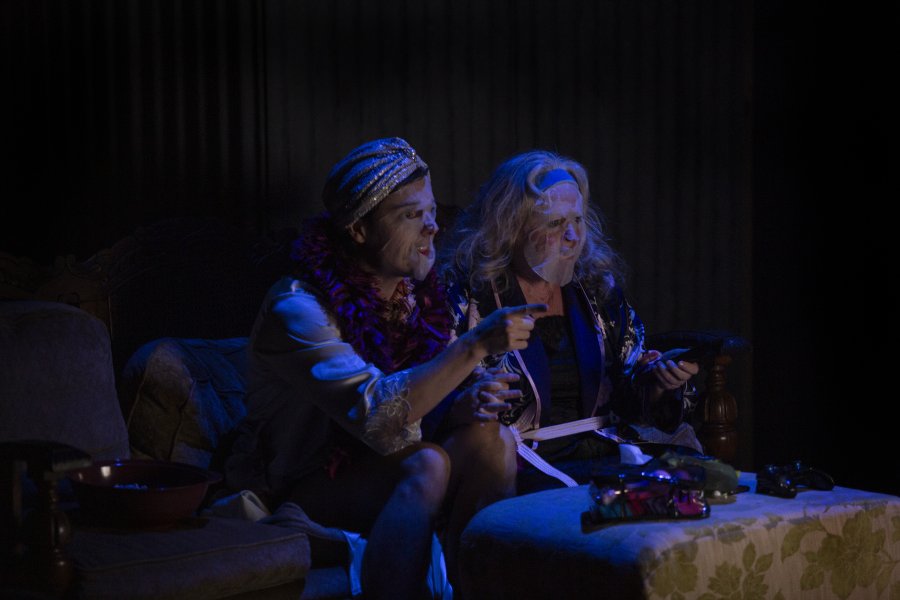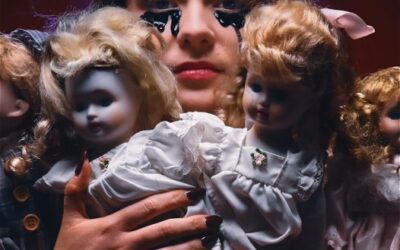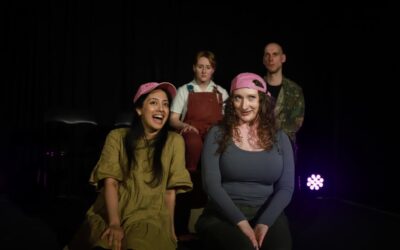By Anna Hayes
The ghosts of the past loom large in Adam Fawcett’s ‘Every Lovely Terrible Thing’ which is running at Theatre Works in St Kilda until March 16. Produced by Lab Kelpie, a Daylesford-based champion for new Australian writing, the play explores intergenerational trauma and the ripple effect that it can have on a family.
The family in question is the Colemans who, for various reasons, are drawn to their rural Victorian home place, a ramshackle house that is falling down around them and yet, there is something in each of them that keeps them anchored to the place.
Each character brings their own personal struggle to the table: widowed matriarch Jerica longs to forget her abusive husband and move on with a new life; her son Charles is preoccupied with cultivating an air of respectability around the family name and business; his sister and twin, Brit, has returned home after many years and is facing a huge life change; Phoebe is ever more distant in her marriage to Charles; while 23-year-old Coop is in a stalemate both from a career point of view, and from the point of having their parents’ support.
The opening scene gives an idea of the bickering and drama that is to come. Charles and Phoebe arrive to Jerica’s house – a sprawling set of levels depicting a living room, kitchen and dining area as well as a back yard, complete with various accoutrements – to find Coop and Jerica watching old movies in nightgowns and painting their toenails. The sight is something of an anathema to Charles who rattles off a selection of clichés around what boys and girls are supposed to do.
Stumbling into the middle of this discussion is Brit, who is made less than welcome by anyone other than Coop, especially when it transpires that the duo has been in text contact quite regularly discussing the possibility of Coop moving to Sydney.
Stalking through this scene is the unseen Kid Coyote, who appears at various intervals throughout the play, adding extra narrative to what’s happening between the family. This is used very effectively, although some lines do get lost in the crossovers.
As the play progresses, we see the budding attraction between Coop and Lachie, the sparkie sent out to fix the home’s rapidly deteriorating electrical infrastructure. These scenes are played with a wonderful exuberance that you can’t help but be charmed by. Coop’s confession to Lachie toward the end of the first act is poignantly powerful and really immerses the audience into an existential debate that they’ve possibly never had to deal with.
The relationship between the twins, Charles and Brit (older by 11 minutes) is also delved into and the hurt and pain of abandonment is extolled by Charles, lamenting the fact that his sister left the family home at 18. What I liked a lot about these moments was how personal they were, and how they didn’t solely exist as a series of accusations and recriminations.
Throughout the play, brother and sister hark back to different incidents in their childhood – Brit rescuing a trapped goat, their back-and-forth about hunting, although that does take a later, darker turn. But these interactions feel utterly genuine, full of the emotions that families share between them even if some struggle to properly express them.
While much of Act I feels like a series of vignettes, there are a few scenes that start to gestate the bigger picture of what this family is dealing with: Jerica’s recounting of her date and inability to get Bob, her late husband, out of her head and, most strikingly, Brit’s diary entries from her childhood in which we are first introduced to Bunny, a human-sized white rabbit who stalks menacingly across the stage. It’s a very effective motif – the symbol of childhood innocence turned insidious and dangerous, and it’s not overused either.
I can recall a modernised production of Verdi’s ‘Rigoletto’ in which the company used the rabbit motif to symbolise the innocence of Gilda but completely overdid it to the point where the final payoff fell flat as a salt plain. Fawcett has used this motif cleverly and sparingly to make these moments in the play all the more powerful.

Director Justin Nott has also made the most of some wonderful moments of zaniness in the play, primarily facilitated by the use of music. Coop’s raw reactions and emotions are generally emphasised by a hip-gyrating joyous blast of music, while the opening of Act II (I won’t spoil the context) has the audience cheering along as if they were at a pantomime.
In many respects, the second act is a tighter affair as the family’s respective secrets slowly begin to unravel. Coop’s relationship with Lachie hits a rather large road block, and Phoebe, very much depicted as ‘a husband’s wife’ type of character has some revelations of her own, and it all plays very authentically given the developments from either side of the interval.
This is a family that has been broken by the past and the present, and yet those breaks also serve to liberate in different ways. At the end of the play, there is hope, maybe because when a family goes through what the Colemans do, all you can do is hope.
The cast is a terrific ensemble that plays off each other with tremendous realism. Every argument, reassurance, reminiscence feels like we are voyeurs of a life rather than spectators at a play.
Lyall Brooks brings an explosive power to Charles, a publican and wannabe politician who is more content to reinvent than reckon with the past. Emma Choy, playing his wife Phoebe, is a quieter character who eventually finds her power in the second act, delivering a searing indictment on her husband and his political aspirations.
Jordan Fraser-Trumble plays Lachie and Kid Coyote to great effect. We get the sense of a man at war with himself but his interactions with Wil King’s Coop are wholesome and hopeful.
Megan Jones is excellent as Jerica, the put-upon matriarch who seems utterly indifferent to her own children, while completely enamoured with and supportive of her grandchild. We feel the guilt rolling off of her in waves in her incendiary argument with Brit, and the desperate sadness of her failed date.
Wil King gives a standout performance as Coop, a character so wrought by challenges and confusions, so desperate for support but not entirely sure what it might look like. While they may not be directly connected to the conflict of the past, they are still affected by the ripples of it, and that’s why you want them to succeed, to find happiness. King charms us completely with Coop, giving him all of the sullen sadness, the love struck hyperactivity and, most affectingly, the raw vulnerability of what it means to be them.
Finally, Sharon Davis gives a powerhouse performance as Brit, the daughter who is hiding an unspeakable secret – you can sense her anguish as she confronts her mother after so many years, posing the question that rebounds in so many broken homes – did you know? Davis gives Brit a wonderful worldly quality – she has got away from home but not the memories associated with it. In the end, she takes on more of a mothering role and there is a warmth to the way she interacts with friends, family and others – she is clearly more at peace.
The final scene where she gives her diary to her brother is striking – she still cannot necessarily put words to her trauma, but it seems to me that Charles knows what’s going to be written in there. It’s a truce of sorts between the duo, an acknowledgement of shared history – good, bad and otherwise.
Images: Pia Johnson





